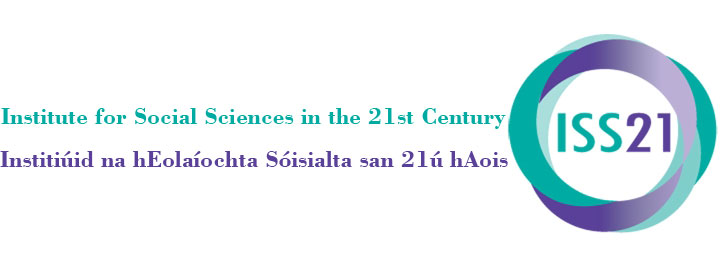In This Section
- Home
- About Us
- Research
- Research Clusters & Working Groups
- Ageing
- Children and Young People
- Research for Civil Society, Environment and Social Action (REACT)
- Genders, Sexualities and Families
- Disability and Mental Health
- SHAPE
- CARE21
- Migration and Integration
- Poverties, Social Justice and Inequalities
- Gender and the Academy Research Working Group
- Crime and Social Harm (CSH)
- Populism and the Rise of the Far-right
- Work, Organisations and Welfare
- TRANSS UCC Working Group
- News and Events
- People
- Events
- Join Us
Forthcoming Seminar: Emerging Research on Public Sector Work

A forthcoming ISS21 seminar will present new research data and perspectives on the experience of working in the public sector in Ireland.
CACSSS Seminar Room, G27 O’Rahilly Building, 1.30-3.00PM, Wednesday 13th November 2013
A 'Cover Your Arse' Culture? How New Public Management style and evaluation measures impact upon street-level bureaucrats and professionals across the Irish public sector
Dr. Julie Connelly
Administrative culture can be simply described as 'the way things get done around here' (Deal and Kennedy, 1982). The literature indicates that an increased emphasis on performance measurement and evaluation systems has been an integral part of New Public Management (NPM) (Alcock, 2003; Taylor and Kelly, 2006). Evaluation of this sort may not always be meaningful in relation to social policy areas as goals are often ambiguous, targets can be difficult to set and results are not always clear. Evaluation measures are a clearly identifiable visible manifestation of administrative culture.
Utilising the Competing Values Framework (CVF) of organisational cultures (Quinn and Rohrbaugh, 1983), this paper analyses data obtained from eighty-three semi-structured interviews with street-level bureaucrats and professionals employed in the delivery of Irish social policy. This research reveals first hand an increasingly bureaucratised administrative culture within the Irish public sector, obsessed with rules and procedures and fuelled by a fear of litigation. Accountability has not been enhanced by NPM, nor does there appear to be any alignment between evaluation systems, if in place, and individual performance. The analysis demonstrates that despite participants expressing a preference for market culture evaluation and accountability mechanisms, they are largely absent in Irish social policy
Employment Equality and the Inclusion of Internationally Educated Healthcare Professionals in the Public Sector in Ireland: Preliminary Findings
Olaniyi Kolawole
Even though the topic of migrant integration in Irish social and political life has received considerable attention from researchers and policy makers, there is a dearth of research on the public employment and workplace inclusion experiences of 'professional' migrant workers. The purpose of this paper is to describe the experiences of International Medical Graduates (IMGs ) in relation to employment equality and workplace inclusion within Irish publicly funded hospitals.
Significantly, in the last decade in Ireland, a large number of IMGs were recruited to fill the gap created by the medicalisation of Irish society, the development of a modern healthcare system, expanding industrialisation and globalisation, and the inability to train and retain sufficient numbers of doctors. Between 2000 and 2010, the numbers of IMGs registered in Ireland increased phenomenally by nearly 300% from 1,746 in 2000 to 6,569 in 2010. Presently, nearly 50% of Irish hospitals’ junior doctors are IMGs and 35% of the total number of registered doctors in Ireland are IMGs.
To gain insight into the employment equality and workplace inclusion experiences of IMGs in Irish public hospitals, semi-structured, face-to-face, telephone and Voice over Internet Protocol (VoIP) interviews were conducted with 20 IMGs in Ireland. Employers and professional organisation representatives were also interviewed. Additionally, secondary data sources such as government and employers’ official websites were visited and data relating to the research topic retrieved for the purpose of analysis. This paper presents preliminary findings from this research.
SPEAKERS
Dr. Julie Connelly
Dr. Julie Connelly recently obtained her PhD in Government from University College Cork. Her PhD, which was funded by the Irish Research Council from 2010-2013, focuses on the ways in which New Public Management ideas impact upon the administrative culture of 'street-level' bureaucrats and professionals working within Irish Social Policy. She is presently lecturing in both the Department of Government and School of Applied Social Studies. Her research interests include public administration and management, reform and working arrangements in the Irish public sector and gender equality.
Olaniyi Kolawole
Olaniyi Kolawole holds an MA in Contemporary Migration and Diaspora Studies from UCC. He is presently a PhD Social Science (GREP) candidate in the College of Arts, Celtic Studies and Social Sciences, UCC. He currently lectures part-time in the department of Sociology in UCC. His research interests are in the dynamics of International Migration, Migrants’ Economic and cultural Integration, Social Inclusion/Exclusion, Nationalism, Citizenship and Identity, Equality, Multiculturalism and Management of Diversity. His PhD research focuses on the professional experiences of internationally educated healthcare professionals in Ireland and Canada.
ALL WELCOME!
Institute for Social Science in the 21st Century (ISS21)
Contact us
Top Floor, Carrigbawn/Safari Building, Donovan Road, Cork, T12 YE30
